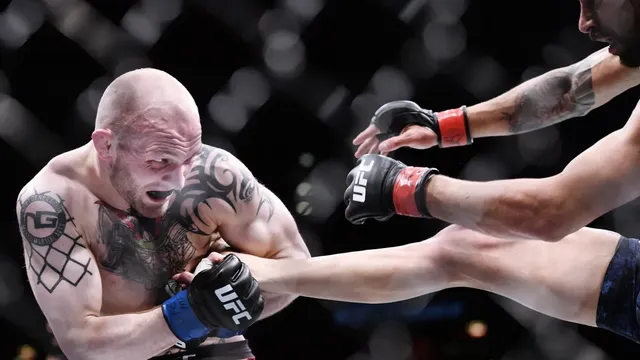This mixture of political testosterone and spectacle seduces part of America.
Donald Trump has never hidden his fascination with brutal, unadulterated masculinity.
But since returning to the White House, this obsession seems to have become a political strategy. Through a partnership with the American mixed martial arts organization UFC, the re-elected president has stepped up his efforts to embody America’s warrior leader in a state of permanent war — even if it means blurring the lines between the political arena and the fighting ring.
Ten months into his second term, Donald Trump is present in both stadiums and boardrooms. Super Bowl, college wrestling championships, NASCAR: he never misses an opportunity to demonstrate his power. In Daytona, Florida, a city known for its auto racing tracks, he congratulated the drivers for their “courage.” A few weeks later, he condemned the NFL’s new concussion rule as a sign of “national weakness.” In June next year, he plans to hold an MMA fight on the South Lawn of the White House, with a weigh-in at the Lincoln Memorial and punching bags for tourists.
The event, advertised as a prelude to the celebrations of the 250th anniversary of the United States, is far from trivial. It is a new chapter in the long history between Donald Trump and combat sports. Since the 1980s, the businessman-turned-president has been working to harness the popular energy of the sport and channel it into his own image. After failing in American football, he invested in boxing, organizing a record-breaking fight between Mike Tyson and Michael Spinks in Atlantic City in 1988. That same evening, Donald Trump was already dreaming of himself as the organizer of a total spectacle combining fame, violence, and politics, writes The Atlantic.
It was with MMA and the UFC that he found his most natural means of expression. The organization, long considered a barbaric spectacle, has built its success on a simple promise: no rules, or almost no rules. This philosophy of absolute confrontation fits perfectly with Donald Trump’s approach to politics. His alliances prove it. His communications director worked for the UFC, Linda McMahon, former head of World Wrestling Entertainment, the American company specializing in organizing wrestling tournaments, is in his government, and even FBI Director Kash Patel is considering collaborating with the league to “train federal agents.”
The UFC, born out of provocative marketing promoting “fight to the death” battles, has always flirted with transgression, and that is precisely what attracts Donald Trump. When the sport was still banned in many states, he was already offering it a stage in his casinos in New Jersey. Dana White, head of the UFC and a loyal supporter of the president, likes to recall that Donald Trump was “the first to believe” in their success. Today, this mutual loyalty goes beyond a simple business partnership: it reflects a shared vision in which brutality becomes a political value.
Donald Trump has gradually introduced this logic of constant struggle into public life. When he was convicted in 2024, he appeared triumphantly near an octagon in New Jersey, greeted by a crowd chanting vulgar slogans against Joe Biden. These scenes, once confined to MMA cages, now infect the stands of golf and American football. At the last Ryder Cup, heated spectators insulted Northern Irish player Rory McIlroy and threw beer at his wife. Thus, sport is becoming a mirror of America, where defeat no longer exists and where humiliating others is part of the game.
Because behind these demonstrations there is no longer just the seduction of male voters seeking strong sensations. “MAGA” has a broader focus: it seeks to elevate violence to a legitimate political language, to delegitimize any notion of boundaries, even symbolic ones. Where George H. W. Bush turned the White House lawn into a horseshoe, Donald Trump wants to build an arena of raw violence. The message is clear: there are no insurmountable boundaries for the American president.
This mixture of political testosterone and spectacle seduces a part of America that dreams of being invincible, but it also contains a cultural poison: that of a nation that confuses courage with aggression, opponents with enemies, victory with destruction. I BGNES

